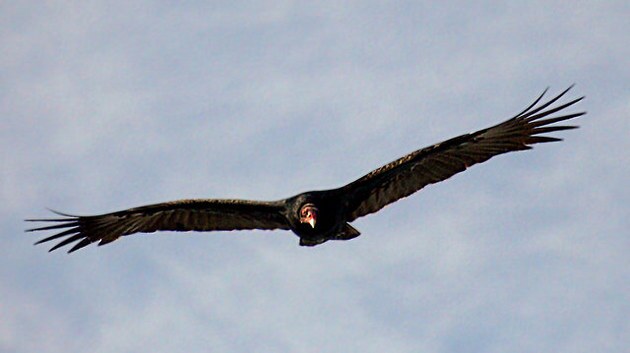Veterinary Drugs Hurting NorCal Turkey Vultures

Turkey vultures are turning up comatose in wildlife clinics in Northern California, and a widely used veterinary euthanasia drug seems to be the culprit, according to state officials.
The news from the California Department of Fish and Wildlife comes after lab work on the stomach contents of six sick vultures revealed all the birds had consumed pentobarbital, a barbiturate often used to euthanize animals. The birds were brought apparently comatose into a Marin County wildlife hospital between July and October of last year.
Turkey vultures, California's most common large scavenging bird species, are at the top of the wildlife food chain, and are extremely susceptible to poisoning when the carcasses they eat are contaminated with foreign substances. Wildlife vets conjecture that the birds were exposed to pentobarbital when someone failed to dispose of euthanized animals properly, instead leaving the carcasses accessible to the vultures.
Cremation and burial are the two accepted methods for proper disposal of euthanized animals. Aside from turkey vultures, other species potentially at risk from pentobarbital-laced carcasses include golden eagles and California condors, as well as mammals such as mountain lions, bobcats, and coyotes.
According to a blog post on the website of Wildcare, the San Rafael wildlife hospital that received the poisoned turkey vultures, one vulture that arrived at the center in August was in such a deep coma that a volunteer checking on the bird actually reported it deceased. Vultures that ingest pentobarbital may appear completely unresponsive and apparently uninjured, though some will show injuries sustained when they lose consciousness while flying.
Though the poisonings were detected late last year, it wasn't until this month that the state confirmed all the birds had been exposed to pentobarbital. The find of six drugged vultures almost certainly implies that an unknown additional number of the wild birds died from exposure to the barbiturate without medical attention.
This isn't the first time that veterinary drugs have been implicated in injuries to vultures; several governments in South Asia banned the anti-inflammatory drug diclofenac for veterinary use in 2006 after that drug was implicated in the die-off of several local vulture species. Closer to home, the U.S. Fish and Wildlife Service has reported that pentobarbital poisonings have claimed the lives of hundreds of eagles and other birds; this report by the agency includes a citation of one eagle who died after eating a euthanized cat in a landfill.
State officials are asking Californians to keep an eye out for comatose or semi-comatose turkey vultures, and to call Wildcare at (415) 456-7283 if they find one. In the meantime, it's a good reminder of the importance of proper treatment of the remains of our livestock and pets; burial or cremation can ensure that the drug used to ease your animal's suffering doesn't cause suffering of its own in someone else.


